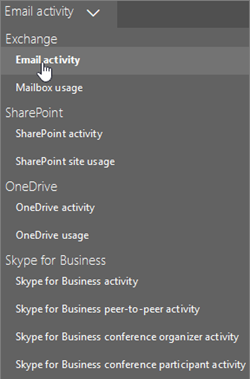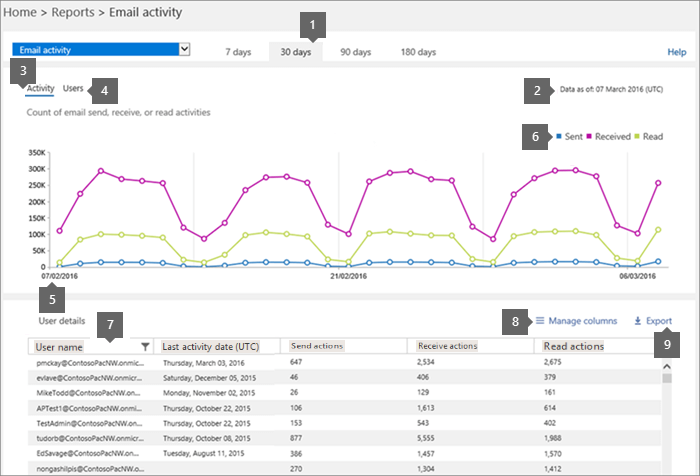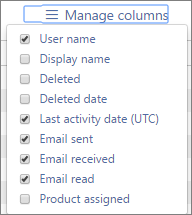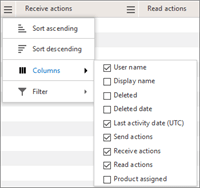Office 365 Reports in the Admin Center - Email activity
The new Office 365 Reports dashboard shows you the activity overview across the Office 365 products in your organization. It enables you to drill in to individual product level reports to give you more granular insight about the activities within each product. Check out the Reports overview topic.
For example, you can get a high level view of email traffic within your organization from the Reports page, and then you can drill into the Email activity widget to understand the trends and per user level details of the email activity within your organization.
Note: You must be a global administrator in Office 365 or an Exchange, SharePoint, or Skype for Business administrator to see Office 365 reports.
How to get to the email activity report
-
Go to the Office 365 admin center > Reports
-
Click on the Email Activity widget on the Reports dashboard or select from the drop down.

Interpret the email activity report
You can get a view into your user's email activity by looking at the Activity and Users charts.

| 1 | The Email activity report can be viewed for trends over the last 7 days, 30 days, 90 days, or 180 days. |
| 2 | Each report has a date for when this report was generated. The reports usually reflect a 24 to 48 hour latency from time of activity. |
| 3 | The Activity chart enables you to understand the trend of the amount of email activity going on in your organization. You can understand the split of email send or read or received activities. |
| 4 | The User chart enables you to understand the trend of the amount of unique users who are generating the email activities. You can look at the trend of users performing send, reading or receiving email activities. |
| 5 |
|
| 6 | You can filter the series you see on the chart by clicking on an item in the legend. For example, on the Activity chart, click or tap Sent, Received or Read |
| 7 | The table shows you a breakdown of the email activities at the per-user level. This shows all users that have an Exchange product assigned to them and their email activities. You can add additional columns to the table. 
If your organization's policies prevents you from viewing reports where user information is identifiable, you can change the privacy setting for all these reports. Check out the How do I hide user level details? section in the Activity Reports in the Office 365 Admin Center Preview. |
| 8 | Click or tap Manage columns |
| 9 | You can also export the report data into an Excel .csv file, by clicking or tapping the Export |
 to see only the info related to each one. Changing this selection doesn't change the info in the grid table.
to see only the info related to each one. Changing this selection doesn't change the info in the grid table. to add or remove columns from the report.
to add or remove columns from the report. link. This exports data of all users and enables you to do simple sorting and filtering for further analysis. If you have less than 2000 users, you can sort and filter within the table in the report itself. If you have more than 2000 users, in order to filter and sort, you will need to export the data.
link. This exports data of all users and enables you to do simple sorting and filtering for further analysis. If you have less than 2000 users, you can sort and filter within the table in the report itself. If you have more than 2000 users, in order to filter and sort, you will need to export the data.
No comments:
Post a Comment